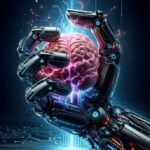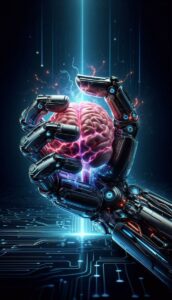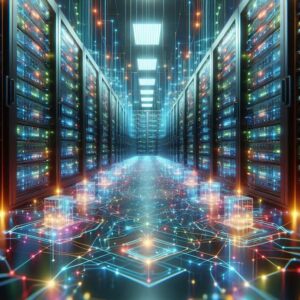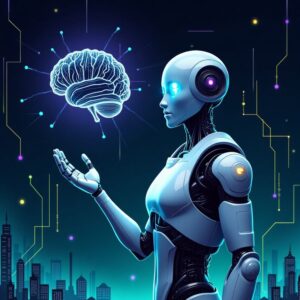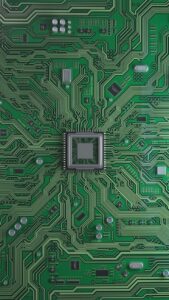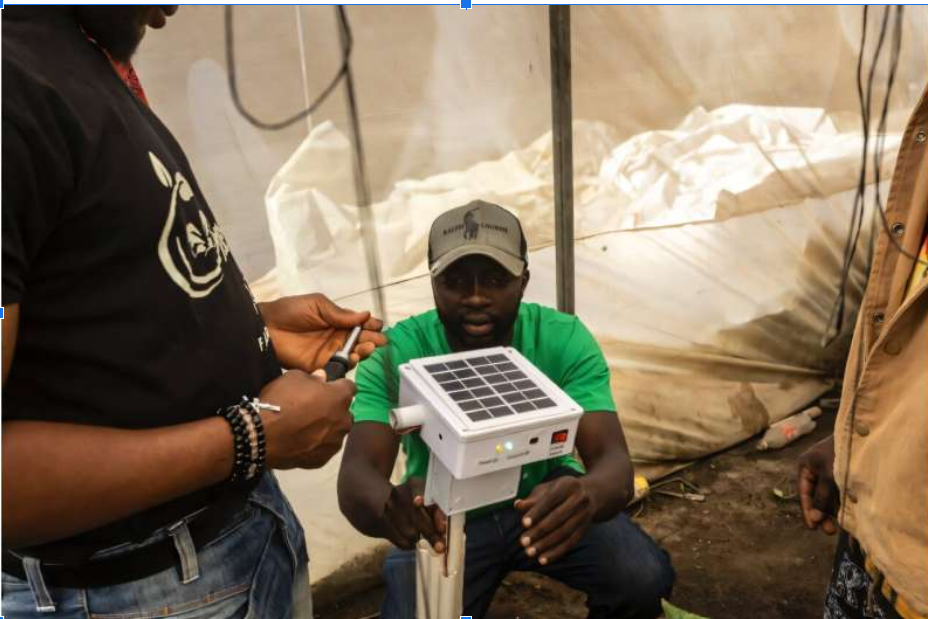
Green Eden technicians installing an IoT greenhouse sensor (‘ScareGrow’ device) in a Jos farm. Such soil probes collect moisture and climate data for AI-powered analysis.
AI agents are reshaping Nigeria’s development landscape. From farms and clinics to power grids and patrol drones, intelligent systems built on AI Agents and IoT are solving real-world problems. Whether it’s a soil sensor triggering smart irrigation or an autonomous drone delivering medicine, these agents are transforming service delivery across agriculture, energy, health, and security.
Startups like GreenEden are not alone. Another Jos-based venture, Anatsor, has turned to IoT for poultry farming. Anatsor’s system uses temperature, humidity and air-quality sensors in chicken coops. When conditions drift outside safe ranges, an AI-driven alert is sent to the farmer’s phone.
One poultry keeper, Mercy Atsuku, says this sensor setup has almost eliminated sudden losses. “When the water is contaminated, it’s no longer good for the chickens. I get a notification,” she explains. Before IoT, Mercy would wake up at night to check the flock; now the system “reduced a lot of stress” for her.
The roughly $150 cost (about 3× local monthly wage) was a significant investment, but she notes the gains in egg production and saved time outweigh it.
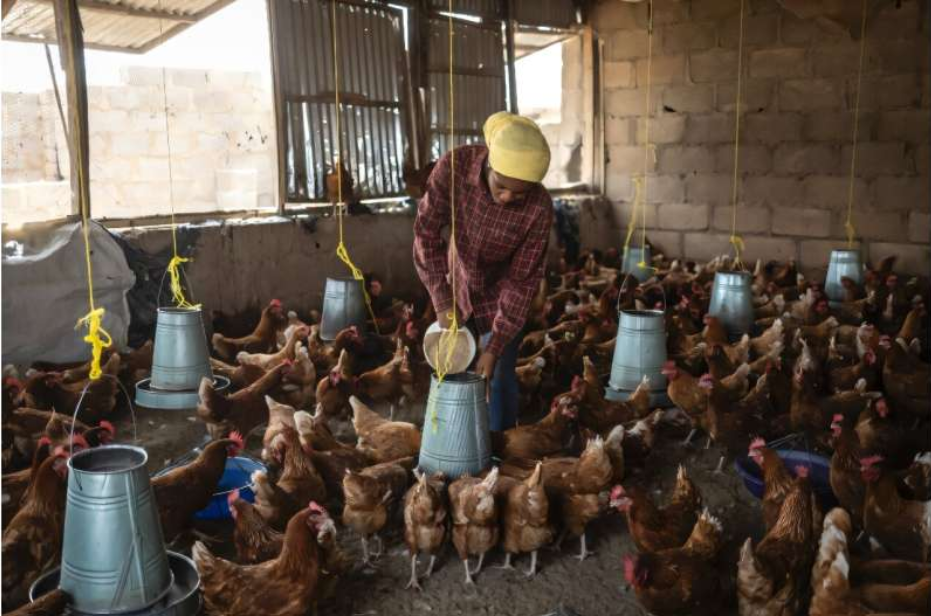
Poultry farmer Mercy Atsuku at her Jos coop, with IoT environmental sensors from Anatsor. The AI-equipped system monitors temperature, humidity and water quality, sending alerts that “reduced a lot of stress” in raising chickens.
In addition to on-farm sensors, Nigeria is also harnessing satellite and drone data with AI Agents. For example, precision-ag startup Zenvus (founded by Nigerian Ndubuisi Ekekwe) uses networked soil sensors plus multispectral cameras. Its system collects soil moisture and nutrient data and sends it to a cloud AI engine. The AI agent then advises farmers on optimal fertiliser use and irrigation. According to UNEP, Zenvus users have seen yield uplifts of up to 50% thanks to data-driven decisions. (In theory, such systems could integrate local weather predictions too.)
The Future of Smart Farming
Looking ahead, experts foresee increasingly agentic farms. Drones and robots could become common: imagine autonomous UAVs mapping fields for pest outbreaks, guided by AI Agents that coordinates with soil IoT data. AI-driven “digital agronomists” might proactively adjust input levels or even control irrigation valves in real time. Startups are already exploring digital extension: one Nigerian developer is working on an AI/ satellite-based service that will SMS pest alerts to farmers’ phones based on machine-learning analysis of imagery (a prototype of a “PestPredict” agent). We may also see blockchain-enabled IoT supply chains: from soil sensor to harvest, an AI agent could log provenance and quality, helping Nigerian farmers access higher-value markets.
Government and NGOs are supporting this vision. Nigeria’s National Digital Agriculture Strategy (developed with IFAD and the World Bank) identifies precision IoT farming as a priority. NITDA (tech regulator) even plans innovation “sandboxes” and research hubs for IoT and robotics. Combined with expanding connectivity (via satellite, LoRaWAN or 5G), these moves could bring smart agriculture within reach of more smallholders. The ultimate goal: democratized AI farming, where even a remote Nigerian plot gets internet-connected soil monitors and an AI assistant. The payoff would be enormous – boosting national food security, rural incomes and resilience to drought by, say, a reliable 10–30% boost in output.
Energy: Smarter Grids and Microgrids
Nigeria’s chronic power shortages – only about 60% grid access nationwide – have long stifled growth. IoT and AI Agents are helping turn that around. Smart meters are a big part of today’s rollout. Engineer Victor Oriakhi, a University of Benin graduate, has built an IoT-enabled electricity meter based on FPGA chips.
His device lets households and businesses monitor real-time consumption and even regulate loads to cut bills. Such metering systems also thwart energy theft by providing accurate usage data. And on a policy level, Nigeria’s regulator, NERC, recently approved ₦21 billion (USD 60 M+) to procure 1.5 million smart meters for free installation for consumers.
NERC explicitly cites “smart metering technologies for data analytics” to reduce commercial losses and improve service. In other words, the government expects AI-equipped metering (IoT + cloud analytics) to tighten revenue flows and rationalise the grid.
On the distribution side, a wave of automated microgrids is taking hold. The cleantech pioneer Husk Power Systems, which operates mini-grids in Nigeria and India, now reports that its systems are “powered by an artificial intelligence platform”. In 2023, Husk raised a $103M fund partly to expand 500 new solar mini-grids in Nigeria.
The company’s CEO says the platform goes beyond selling electricity – it “goes beyond just electricity sales to…energy-efficient appliances, e-mobility…including e-mobility, agro-processing and cold storage” – and this entire ecosystem is becoming “more intelligent and automated, powered by AI and IoT.”. In practice, their user app already lets villagers check usage and make mobile payments, while the grid controller uses AI to balance loads and storage. These microgrids are giving power to thousands of small enterprises that national grids never reach. By avoiding petrol generator costs and outages, businesses effectively gain economic resilience.
Even established firms are betting on IoT energy. Nigerian startup Greenage Technologies (not to be confused with Husk) is installing solar + storage “smart generators” for homes and clinics. These systems come with IoT-enabled inverters and a cloud dashboard, so owners can remotely monitor and optimise usage. (Greenage’s marketing touts that its systems let “businesses and households monitor and optimise their energy consumption” via IoT sensors.) Meanwhile, telecom giant MTN Nigeria has launched an IoT connectivity platform (MTN IoT Connect) to serve smart metering, and home solar installers often bundle Wi-Fi/4G smart-plugs to log appliance data.
Future of the Grid
Looking ahead, Nigeria’s energy future points to self-managing networks. One vision is a fully smart national grid with AI agents autonomously adjusting flows. For example, multiple distributed generators (solar roofs, mini-hydro) could be orchestrated by an AI “grid optimiser” to match demand patterns minute-by-minute. Demand-side “agent” devices (smart thermostats, EV chargers) could respond to price signals generated by AI, smoothing peaks. Telecom operators are even eyeing IoT blockchain networks for peer-to-peer energy trading. In remote towns, fleets of drones or robots might service solar arrays: for instance, dust-cleaning robots for panels, guided by AI vision. Government plans reflect this: NITDA has said it will fund IoT/UAV/energy centres and train millions of tech talents by 2027.
In security terms, these innovations mean Nigerians could have 24/7 power reliability – clinics with perpetual solar + battery backups, streetlights that adapt to activity levels, and remote monitoring of grid health. Economically, cheaper, reliable power directly boosts productivity in farms and factories. Nigeria’s “energy as a service” market – already seeing new financing models – could mature to embrace AI-managed solar microgrids in every rural community. Reduced reliance on diesel generators (and imported fuel) also cuts subsidy costs, freeing public funds.
However, challenges remain: only around half of Nigerians have consistent grid access, and rural connectivity is spotty. IoT solutions often require cellular data or LoRaWAN; expanding backhaul (via satellite or fibre) is crucial. Moreover, cybersecurity of smart grids will become critical, requiring regulation and local expertise. Nigerian regulators have begun drafting smart-metering standards, but a comprehensive IoT security policy is still developing.
Health: Connected Care and Telemedicine
In healthcare, IoT devices and AI agents are starting to fill huge gaps. Nigeria suffers from doctor shortages and rural access issues, so telemedicine and remote monitoring are key. In 2023, the government’s satellite agency (NIGCOMSAT) launched NigComHealth, the country’s first national telemedicine platform. It lets any Nigerian schedule consultations with qualified doctors via video/phone, addressing the shortage of specialists in remote areas. Under the hood, this platform relies on IoT-grade satellite connectivity to clinics and a cloud-based AI scheduling system (managed in partnership with Canadian startup Ethnomet) to match patients with the right doctors. While NigComHealth is still expanding, it demonstrates a policy push toward digital health delivery.
Startup Helium Health (Nigeria) is digitising clinics with an AIoT approach: its software manages electronic health records (EHR) and telehealth, while integrating simple bedside sensors. Helium’s app can sync data from glucose monitors or heart-rate wearables, flagging clinicians when values exceed thresholds. Similarly, insurers like MicroEnsure are beginning to pilot IoT wearables (e.g. blood-pressure bracelets) to enable dynamic premium pricing. According to industry reports, wearable health devices have seen a boom in Nigeria – fitness trackers and clinical monitors are now sold in major cities.
Patients with chronic conditions (diabetes, hypertension) can carry IoT glucometers that auto-upload readings. If the AI backend detects a worrying trend, it can trigger an alert or appointment recommendation. In other words, AI agents are quietly learning each patient’s vital-sign patterns and helping clinicians intervene early.
Another game-changer is drone logistics for medicine. In 2023, Zipline (the US drone-delivery company) opened a drone distribution centre in Yenagoa, Bayelsa State. From this hub, autonomous fixed-wing drones fly vaccines, blood and lab samples to remote health clinics across the Niger Delta. Though Zipline’s drones originate abroad, the centre is locally staffed and licensed; it showcases how IoT (GPS, temperature monitors) plus a flight control AI can overcome Nigeria’s poor roads. Soon, hundreds of off-grid clinics will get next-hour delivery of essential drugs. This “last-mile” IoT application vastly improves service delivery: in emergency cases, a doctor in Port Harcourt can order blood and have it there by drone in minutes, a task that once took days.
The Future of Healthcare AIoT
Looking forward, imagine each Nigerian patient having a personal AI health agent. Worn sensors could continuously track vital signs (ECG, SpO2, activity), feeding data to an AI that learns the patient’s health profile. The agent could then provide 24/7 guidance: alerting emergency services if it detects a heart attack pattern, or sending a diabetic patient reminders to eat based on their blood sugar IoT cuff. Hospitals might deploy connected MRIs and X‑rays whose images are instantly analysed by AI radiologists, speeding diagnoses.
On the public health level, AI models could use IoT data (water sensors, social media scans, and clinic logs) to predict outbreaks of cholera or malaria before they spread. Some research prototypes already show AI predicting cholera risk from rainfall and sanitation data.
Economic impact is compelling. Better remote monitoring reduces expensive hospital stays; it empowers patients to stay healthy and productive. Expanded telehealth shrinks travel and wait times (a boon in a country where rural patients may otherwise never see a doctor). New businesses will emerge – local startups for IoT medical devices, data services, and health apps. Nigeria’s recent committee on digital health (the NDHI) envisions a unified EMR system for all citizens – a data infrastructure that AI Agents could leverage for population health planning. If properly steered, these technologies promise both lower-cost care and new jobs in the booming healthtech sector.
Key hurdles include regulation, privacy, and Internet access. Only about 40% of Nigerians are online today, so scaling remote health requires expanding broadband (satcom or fibre). Data security is another concern: medical IoT devices must encrypt sensitive patient data. So Nigeria will need strong e-health regulations and partnerships with secure cloud providers. Nonetheless, the government’s commitment to digital health (as in the NDHI) and the vibrancy of startups like Helium Health indicate a clear path ahead.
Security: AI Agents and IoT Defenders
Nigeria’s security environment – from urban crime to insurgency – has spawned innovative uses of AI+IoT for public safety. A prime example is the new police drone program. In mid-2024, Inspector-General Egbetokun announced that the Nigeria Police Force will deploy a “full drone system” nationwide. High-resolution cameras and sensors aboard UAVs will stream live data to a central command centre in Abuja. The IGP declared that “ungoverned spaces will soon become governed” once drones can fly over forests and deserts to detect criminals at crime scenes. In practice, this means bandit camps or kidnap hideouts that were once invisible may now be monitored continuously. Already, the government has a small drone fleet; the new plan is to expand it massively.
AI also enters police work via analytics and automation. For example, analysts have suggested using AI agents to scan social media in local dialects for early signs of sectarian violence. Machine-learning models could map crime hotspots by blending IoT feeds (CCTV cameras, license-plate readers, emergency-call data) with reports. Facial-recognition systems (controversial, but under consideration) might alert police when known suspects move between states. The Cable columnist Sheriffdeen Folaranmi argues that Nigeria “can—and must—do the same” as other countries, using AI Agents to predict shooting-prone areas, extremist recruitment, etc.. He calls for piloting AI surveillance on major highways and hotspots, and empowering local AI startups (CcHub, Data Science Nigeria) to build homegrown security solutions.
Future Security Scenarios
Envisioned futures include smarter cities and border protection. IoT networks of sensors (motion detectors, acoustic guns, gas sniffers) combined with AI agents could automatically alert authorities of anomalies, for example, recognising the sound of gunfire and dispatching a drone to the location. Autonomous security robots or drones might patrol major markets and campuses. In agricultural belts, IoT trackers on livestock and vehicles (already used to track cattle rustlers) could feed AI pattern recognition to prevent bandit raids. Even in cybersecurity, Nigeria’s financial and telecom firms are beginning to use AI-driven intrusion detection to guard IoT infrastructure (since unsecured IoT devices can be hacked into botnets).
These capabilities carry huge impact potential. Better real-time monitoring and prediction would deter crime and attract investment. People would feel safer using cashless payment (backed by secure IoT payment terminals) and commuting after dark under smart streetlights with cameras. Economically, safer cities and highways mean more business confidence; agribusiness can flourish if herder–farmer violence drops through technology. In sum, AI Agents+IoT security tools could help break the cycle where citizens feel forced to take “jungle justice” into their own hands.
However, there are strong caveats: civil liberties, legal frameworks and data jurisdiction. The Cable notes (and we echo) that Nigeria needs clear AI security policies and oversight before deploying these tools. Facial recognition, for example, must be regulated to prevent abuse. Mobile connectivity is again a limitation: real-time AI agents need reliable Internet or satellite links, which may be spotty in border zones. Still, pilot projects like the police UAV fleet show that AIoT for security is moving from sci-fi toward reality in Nigeria.
Societal Impact: Service, Empowerment and Resilience
The integration of AI agents with IoT in Nigeria is not just technical showmanship – it’s reshaping service delivery, economic opportunity and societal resilience:
- Enhanced Service Delivery. Connected technologies bring services to the underserved. In health, telemedicine (NigComHealth) and IoT wearables mean rural patients now see doctors via video or get blood deliveries by drone. In energy, smart meters and microgrids translate into more reliable electricity for homes and clinics; outages and unfair billing can be drastically reduced. In agriculture, extension services can be automated: an AI app may advise a farmer on planting dates or pest controls based on live IoT weather data and historical yields. In security, emergency response can be sped up – police are dispatched faster via drone sighting, and civilians receive quicker alerts. Overall, citizens get better, faster, personalised services.
- Economic Empowerment. By boosting productivity, these technologies create wealth from the ground up. The 20–50% yield gains reported by IoT+AI farms flow directly into farmers’ pockets and the food supply. Solar microgrids cut fuel costs for businesses and enable mini-enterprises (cold storage, welding, phone-charging kiosks) in off-grid towns. Startups themselves – like GreenEden, Anatsor, Helium Health and dozens more – are new employers; investors are taking notice, as seen by recent agritech funding rounds. Skills development initiatives (e.g. NITDA’s 3MTT program) are training a generation of IoT/AI engineers. Even consumers benefit economically: smart apps can optimise household energy use to lower bills, and mobile cash transfer to farmers bypasses corrupt intermediaries. In short, data-driven tech turns ordinary citizens into smarter entrepreneurs and informed consumers.
- Resilience to Shocks. Nigeria faces climate, economic and security shocks. AIoT can buffer against all these. Precision farming techniques (driven by IoT sensors and climate models) make food production more drought- and pest-resistant. Renewable energy networks with AI storage management keep power on during fuel-price spikes or grid failures, fostering energy independence. In security, proactive threat monitoring enhances national stability. Critically, many IoT devices operate at the edge: they can continue collecting and locally analysing data even if connectivity drops, then sync when networks return. This distributed intelligence means communities can be self-reliant in crises.
In each case, the key is inclusion. For maximum impact, the government and the private sector must ensure these innovations reach across regions and income levels. Expanding rural broadband and electrification will allow more citizens to join the IoT+AI Agents ecosystem. Likewise, public–private partnerships (like NERC’s metering fund or NITDA’s tech hubs) help spread the benefits beyond wealthy elites. Ultimately, when a smallholder in Kano can access an AI-driven irrigation controller, or a housewife in Bayelsa gets medicine by drone, Nigeria as a whole becomes more robust and inclusive.
Conclusion
Nigeria’s leapfrogging into an AIoT-powered future is well underway. Today, we see tangible examples – sensor networks raising farm output, smart grids stabilizing power, telehealth extending care, and drones patrolling highways – all hinting at a larger transformation. Tomorrow, as these systems mature, Nigeria could boast some of Africa’s most advanced smart-farming, renewable energy, e-health and security infrastructures. The combination of vast market need, youthful tech talent, and supportive policy (like Nigeria’s IoT research centres) makes this evolution plausible.
For experts watching Africa, Nigeria’s path offers lessons: focus on impact-driven innovation, nurture local solutions (at Code Hub Lagos or Jos incubators), and align emerging tech with national priorities (food, power, health, safety). When IoT devices meet autonomous AI agents in Nigeria, they do more than collect data – they begin to make decisions.
This is the essence of the Digital Nigeria 2.0 era: connected devices and intelligent software working hand-in-hand to unlock productivity and resilience. The journey will have challenges – infrastructure gaps, data policies, ethics – but the potential payoff is transformative. Nigeria’s society and economy stand to gain enormously as technology learns to act, in real time, for its people.
Sources: Current examples and figures are drawn from recent industry and news reports, among others. All statements are backed by cited references.
Contact Cloud Technology Hub for a strategy consultation, or read more blogs here!

